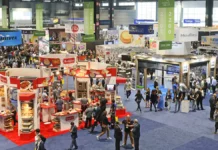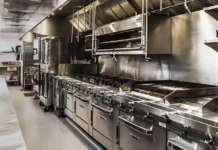
By Ian Christopher, co-founder and CEO, Galley Solutions
College & University (C&U) dining services are struggling for revenue during COVID-19. Many haven’t seen much — if any — revenue from students or staff since early spring. And as more than three out of four students plan to return to campus this fall, C&U food operators have quickly strategized major changes in operations to prepare for students’ safe return.
This is not an easy feat, given how complex on-campus dining operations are to meet the needs of increasingly diverse student bodies. Outside of the staple dining hall, more than half of C&U food operators say revenue is increasing at locations that support dietary restrictions, 40% say they’ve seen an increase in revenue at on-campus convenience stores, and 37% have seen an increase at on-campus coffee shops.
Students have certainly been spoiled with dining options in the last decade plus. Along with different types of eating establishments outside of campus dining halls, C&Us have also introduced new menu options for vegans and vegetarians as well as students who require gluten-free, halal, or kosher meals.
As C&Us debut new menu items and food formats, they introduce even more complexity into their operations. While this evolution has dramatically improved students’ C&U food experience, it’s forced university food operators to completely reimagine on-campus dining with COVID-19 guidelines in mind.
Shortening menus and eliminating hyper-customization
C&U dining options are typically vast, though many will opt for abbreviated menus this school year that limit the number of dishes C&U kitchens will make. The traditional meal customization, build-your-own, and self-serve options will be eliminated to limit person-to-person contact and avoid cross-contamination.
Shortened menus allow kitchen staff to more efficiently work with social distancing in place. Cutting down on menu items means C&U food operators can simplify purchase ordering, which makes it much easier to track demand, cross-utilize ingredients, and minimize waste. As a result, abbreviated menus enable a more streamlined production and clearer margins.
A greater focus on sanitation, not sustainability
C&Us have made great strides in recent years to support more sustainable operations through sourcing locally grown foods and reducing the use of single-use plastics.
However, cleanliness and social distancing measures have taken priority in the COVID-19 campus environment. Unfortunately, that means C&Us are taking steps backward in sustainability as a greater need for pre-packaged foods and disposable utensils, cups, plates, and more will potentially fuel an increase in waste.
Though there’s no immediate solution to the inevitable uptick in single-use plastics, C&Us can improve sustainability efforts elsewhere in their operations. For example, food operators can prioritize food that can be freezed and thawed without a big drop in quality, or that have flexible minimum order quantities from vendors, to minimize waste.
Delivery 101: Intro to ghost kitchens
C&Us will transform on-campus kitchens into delivery and takeaway only ghost kitchens, which actually allow them to operate more efficiently in terms of labor, waste, and output.
A ghost kitchen is a delivery-only kitchen that doesn’t allow physical space for customers to eat inside. Orders are made on-location, and delivered to the customer, which is a much safer method for students to enjoy meals instead of during the crowded 6 p.m. dinner rush in the dining hall.
While most food establishments work off a roughly 5% food margin, ghost kitchens that use technology to optimize recipe costs and purchasing can increase that up to 8%. This can have a massive impact on C&U dining’s bottom line, which is much needed after revenues have been stagnant for months.
On campus dining in the COVID-19 environment
C&Us will continue to rely on abbreviated menus, sanitary services, and increased takeout and delivery services to remain financially solvent through the pandemic. As students begin returning to campus, the C&U dining transformation is imperative to keep food options open and reliable for returning students and faculty.
 Ian Christopher is CEO and cofounder at Galley Solutions, where he helps restaurants, food operations, and commercial kitchens increase efficiency, streamline operations, and thrive like never before. Connect with Ian at LinkedIn, and connect with Galley at LinkedIn and Twitter.
Ian Christopher is CEO and cofounder at Galley Solutions, where he helps restaurants, food operations, and commercial kitchens increase efficiency, streamline operations, and thrive like never before. Connect with Ian at LinkedIn, and connect with Galley at LinkedIn and Twitter.

























